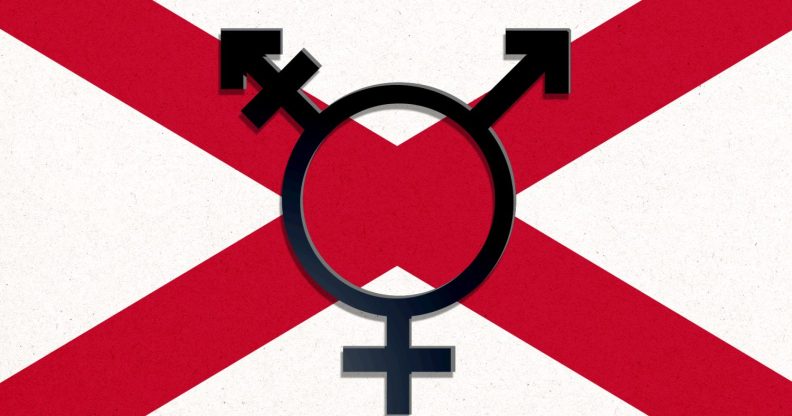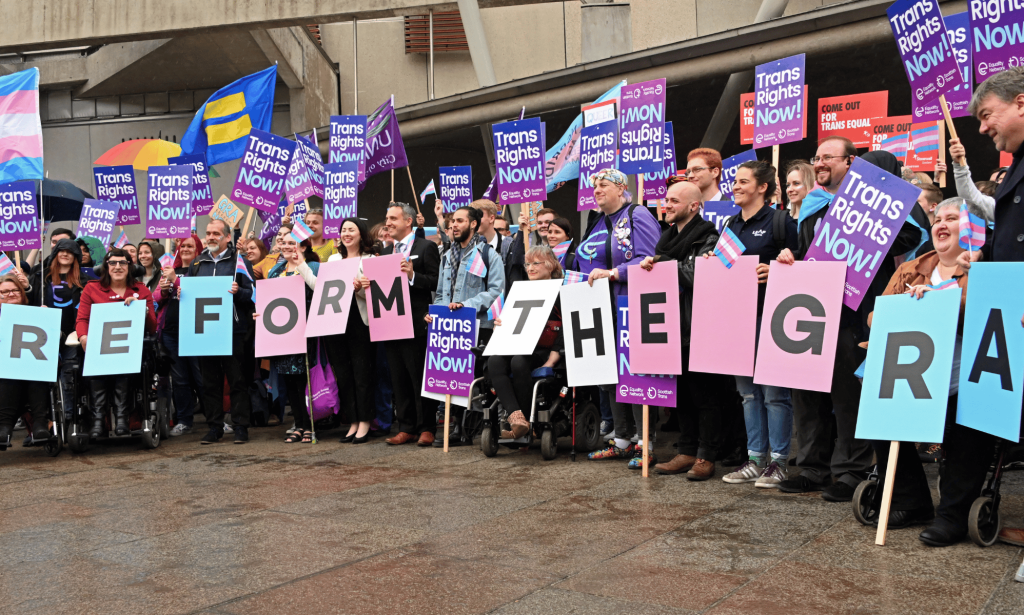Gender law reform in Northern Ireland would have ‘positive impact’ on trans people, report finds

Trans people in Northern Ireland described the gender recognition process as “inaccessible and hostile”. (Pink News)
A Stormont-commissioned report has found that reform of the Gender Recognition Act would have a “significant positive impact” for the trans community in Northern Ireland.
The report was produced by a group of researchers at Queen’s University Belfast, having been commissioned in May 2021 by then-finance minister Conor Murphy.
Researchers analysed policies, scientific literature and previous consultations on GRA reform conducted in the UK and the Republic of Ireland, as well as carrying out four studies to paint a picture of the views and experiences of trans people in Northern Ireland.
Currently, the Gender Recognition Act 2004 (GRA) applies to all of the UK, and enables trans people to change the sex marker on their birth certificate, allowing documentation like marriage and death certificates to record their correct gender.
In order to obtain a Gender Recognition Certificate (GRC), the act stipulates that trans people must live fully in their affirmed gender for at least two years, and must provide medical evidence which is reviewed by a panel.
There are also several outdated requirements, including that married applicants acquire the consent of their spouse. In 2020, ahead of the legalisation of same-sex marriage in Northern Ireland, trans people were forced to get divorced if they wanted to access a GRC.
“Most participants felt that the process is demeaning and dehumanising,” researchers said.
“A commonly held concern was that the people on the GRC panel dealing with the documentation do not ever meet the person applying – that the decisions about their gender are made by people who do not know them.
“Participants find this insulting and they feel invisible, particularly due to the fact of being assessed by people who have not lived through the experience themselves.”

The report found that just 92 people have acquired a GRC in Northern Ireland since 2005, and that “the complex nature of the application process and the mental energy required to complete it had discouraged many people from applying”.
Mental energy is a resource “often depleted” among the trans community, researchers said, “who are coping with fear or other difficulties related to experiences of transphobia”.
Those interviewed for the report who had undergone the process of applying for a GRC said that from start to finish it took between two and six years.
To even begin the process, trans people must provide evidence of either a diagnosis of gender dysphoria or evidence they have undergone lower surgery. But with waiting times for Northern Ireland’s only NHS gender clinic – the Brackenburn clinic – at around four years for a first appointment as of 2021, trans people are left “so exhausted by the journey through health services that another process seems an awful lot”.
“It feels… like it’s deliberately been made as impossible and inaccessible and hostile as possible,” said one respondent.
Cost is also an issue, researchers found, despite the reduction in price of a GRC from £140 to £5 last year, because of the out-of-control waiting times to get an NHS appointment, trans people who are able to often turn to private healthcare must sometimes pay a huge amount to travel to a clinic.
“One participant claimed that a single session with a consultant cost a minimum of £160 to £300, and if a report was generated for that, that would cost between £100 and £200,” the report said.
The general public does not understand what a Gender Recognition Certificate actually is
Amid the relentless “politicisation of the transgender community” in the UK, researchers said participants reported widespread “misrepresentation and misunderstanding about core issues”, including what a GRC actually does.
“[An] issue that has been raised is that a self-identification system would complicate and possibly endanger the use of single-sex space services and spaces,” the report states.
“Indeed, some places are single-sex, such as the majority of public toilets, changing facilities in shops and sports facilities. There are also single-sex services such as counselling or refuge homes provided to rape and intimate partner violence victims.
“While these concerns need to be seriously considered, it should be noted that a change in the GRA would not impact on the use of these spaces.”
Reform of the Gender Recognition Act would not grant trans people any further rights, including when it comes to access, and researchers noted: “Such single-sex services have been open for trans people for many years (unless there are exceptional circumstances), and the vast majority are operating smoothly in a trans-inclusive manner, and without any major incidents.”
In conclusion, the report found that “reform of the GRA… would have a significant positive impact for the transgender community”.
“Changes to the process are crucial to the lives of trans individuals,” researchers said.
“The process for those who wish to apply for a gender recognition certificate should be made easier and more accessible.”
A UK-wide consultation on Gender Recognition Act reform was carried out in 2018, and although it showed overwhelming support for the right of trans people to self-identify and for medical requirements to be dropped, the Conservative government instead made minor administrative changes to the process.
In Scotland, however, a series of consultations and the unwavering support of Nicola Sturgeon has ensured that a bill to reform the process passed its first vote in Holyrood in October.
Research participants were cautiously hopeful for a similar result in Northern Ireland, with one saying: “We very rarely have a conversation in this country about what type of country we want to be… And you know, what we have to our advantage here is that we have a closer relationship with our policymakers and our politicians than you have in other parts of the UK.”
How did this story make you feel?

